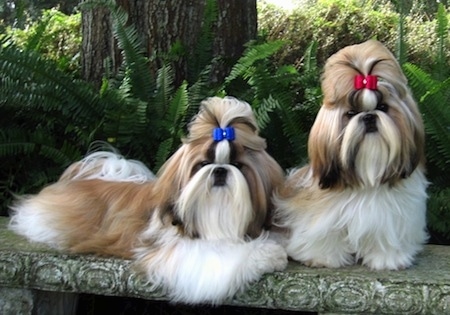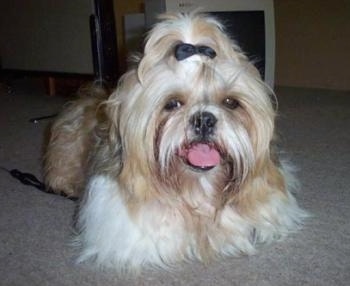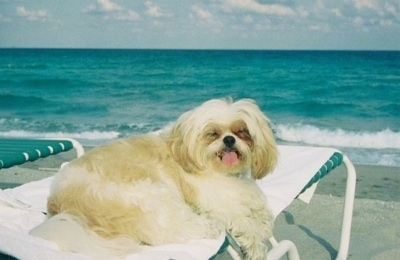(Lion Dog) (Chrysanthemum Dog)
PronounciationIn the Chinese pronounciation the "ds" is pronounced the same as the "ds" at the end of the word "Words". It is Chinese Mandarin, and translates directly to "lion". That is where the term "lion dog" comes from. The moniker "chrysanthemum dog" and "sheet-sue" are common in America, but are both inaccurate American renditions of the original Chinese.
Description
The Shih-Tzu is a small, sturdy dog, with a body that is slightly longer than it is tall. The head is round and broad, wide between the eyes. The square muzzle is short, an inch or less from the tip of the nose to the defined stop. The nose is broad, with well open nostrils. Nose, lips, and eye rims are liver on liver colored dogs and blue on blue dogs and black on all other colors. The teeth meet in a level or under bite. The large, round eyes are dark in color, but lighter on blue and liver dogs.
The large, pendant, low-set ears hang down and are covered in abundant hair. The back is level. The muscular legs are straight and well-boned. The high-set tail is carried over the back covered in abundant hair. Dewclaws are sometimes removed. The double coat is dense and long, flowing down over the dog. The hair above the eyes is often tied in a topknot. There is a profuse beard and mustache and the hair on the muzzle is short. Coat comes in all colors.
Height: Up to 11 inches (28cm.)
Weight: 9-16 pounds (4-7kg.)
Life Expectancy: About 15 years or more.
Temperament
The Shih-Tzu is an alert, lively, little dog. Happy and hardy, packed with character. The gentle loyal Shih-Tzu makes friends easily and responds well to consistent patient training. They make a very alert watch dog. Courageous and clever. Playful and spunky, this affectionate little dog likes to be with people and are generally good with other pets. Some can be difficult to house break.
The Shih Tzu needs all of the humans in the house to be pack leader, with the rules of the house made consistently clear. Owners who allow their dogs to take over may find them to be snappish if they are surprised or peeved. Because of this dogs sm`ll size and it's adorable face, they commonly develop small dog syndrome, human induced behaviors where the dog believes he is the boss of human. This causes a varying degree of behavioral issues, such as, but not limited to separation anxiety, guarding, growling, snapping, and even biting.
They may become untrustworthy with children and sometimes adults, as they try and tell the humans what THEY want THEM to do. They will be obstinate as they take their stand and defend their top position in the pack. They may bark obsessively as they try and TELL you what they want. These behaviors are NOT Shih Tzu traits, but rather behaviors brought on by the way they are treated by people around them. Give this dog rules, and limits to what they are and are not allowed to do. Be their firm, stable, consistent leader pack. Take them for daily pack walks to burn mental and physical energy. Their temperament will improve for the better, and you will bring out the sweet, trustworthy dog in them.
Shih Tzu are lively and energetic companions. Yet, they are also amazingly low-key and satisfied—assuming they get an adequate amount of attention. They like nothing better than to be held, stroked, petted and pampered by their owners, and are perfectly happy sitting on the couch with you for hours while you dote on them. This is a noble breed—sometimes translating into arrogance and haughtiness, other times into courageousness and politeness—but they are never too proud for a roll on the floor with a treasured squeaky toy.
Living Conditions: The Shih Tzu is good for apartment life. They are fairly active indoors and will do okay without a yard. This breed is sensitive to the heat.
Health Problems
Prone to slipped stifle and spinal disc disease caused by a long back and short legs. Also ear infections, eye problems and early tooth loss. Tends to wheeze and snore and can have respiratory problems. These dogs gain weight easily and should not be overfed.
Exercise
The Shih Tzu need a daily walks. Play will take care of a lot of their exercise needs, however, as with all breeds, play will not fulfill their primal instinct to walk. Dogs who do not get to go on daily walks are more likely to display behavior problems. They will also enjoy a good romp in a safe open area off lead, such as a large fenced in yard. Do not over feed this breed or it will quickly become fat.
Grooming
These little dogs require a good daily grooming using a bristle brush. When kept in along coat a topknot is usually tied to keep the hair out of the dog's eyes. Some owners prefer to have them trimmed to make the coat easier and less time consuming to care for. Keep the ear passages and area around the eyes clean. Shih-Tzu's have sensitive eyes that need to be kept clean. There are special drops you can buy to put in them if needed. Ask your vet what to use on your dog. This breed sheds little to no hair and are good for allergy suffers if their coats are kept very well groomed, do to the fact that they shed little skin dander.
Origin
Sixteenth century documents and paintings show dogs resembling the Shih-Tzu. The Shih-Tzu is said to have descended from crossing the Lhasa Apso or Tibetan mountain dog and Pekingese, in the city of Peking in the 17th century. The dogs were favorites of the Chinese royals and were so prized that for years the Chinese refused to sell, trade, or give away any of the dogs. It was not until the 1930s that the first pair was imported to England, when it was discovered by English soldiers during World War II. The Shih-Tzu was recognized in Britain in 1946. The AKC recognized the breed in 1969.
Group: Herding, AKC Toy classed under the Non-Sporting Dogs category.
Recognition: CKC, FCI, AKC, UKC, KCGB, CKC, ANKC, NKC, NZKC, CCR, APRI, ACR, DRA, NAPR
Things You Should Know
As you can see by looking at one, Shih Tzus require more care than other breeds, especially when the hair is kept long. They need daily brushing and regular haircuts to avoid tangles. However, they shed very little dander, making them a great pet choice for people with allergies. Though good family dogs, Shih Tzu are not especially good with very young children. They cannot be handled roughly or awkwardly and tend to get snappish when their patience wears thin.
Feeding note: Keep an eye on Shih Tzu while they are drinking. Because their noses are so centrally located, water can easily block their breathing.
A healthy Shih Tzu can live as long as 15 years. Common health issues include hip dysplasia, ear and kidney infections, and eye problems. Check their ears and eyes regularly for cleanliness. (You can even find special eye drops for them). They are great apartment dwellers, but not happy in hot climates. And while they don’t require as much exercise as a Lab, a daily walk is necessary.
HypothyroidismThis is a thyroid malfunction that occurs when the thyroid gland stops functioning and producing thyroid hormone responsible for proper metabolism. This malfunction is commonly attributed to immune system problems. It is usually affects middle-aged dogs and is seen in all breeds. Symptoms include hair loss, weight gain, muscle loss, and lethargy. If left untreated, it can result in heart problems. This disease is usually diagnosed through blood tests. It can be effectively treated with drug therapy | ||







You could refer the best muzzle for your lovely pets. Have a nice day.
BalasHapus